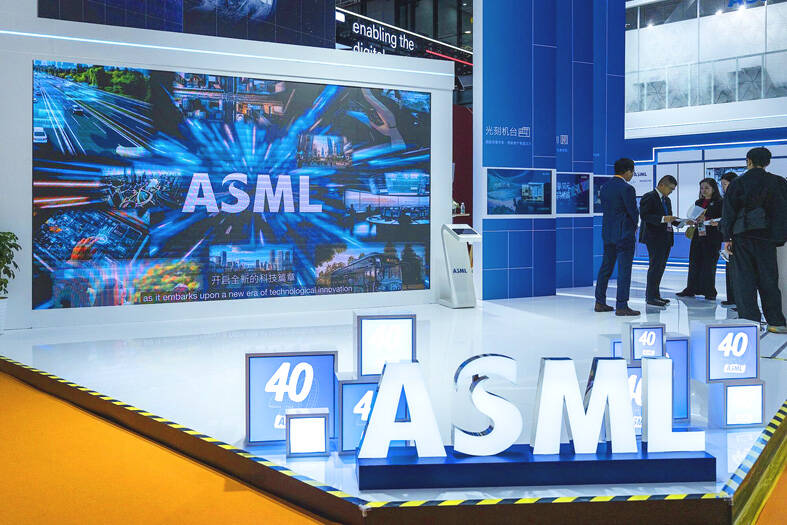A former ASML Holding NV employee is facing a lawsuit in the Netherlands over suspected theft of trade secrets, Dutch public broadcaster NOS said, in the latest breach of the maker of advanced chip-manufacturing equipment.
The 43-year-old Russian engineer, who is suspected of stealing documents such as microchip manuals from ASML, is expected to appear at a court in Rotterdam today, NOS reported on Friday.
He is accused of multiple violations of the sanctions legislation and has been given a 20-year entry ban by the Dutch government, the report said.

Photo: Bloomberg
The Dutch company makes machines needed to produce high-end chips that power everything from electric vehicles to military gear, and it has benefited from a surge in artificial intelligence spending.
It has also been the target of earlier data breaches.
ASML accused a former Chinese employee of stealing chip data last year.
The former worker took data from a software system that the corporation uses to store technical information about its machinery. The employee then went on to work for China’s Huawei Technologies Co (華為).
ASML has previously accused Dongfang Jingyuan Electron Ltd (東方晶源微電子科技) of obtaining its technology and transferring it to China.
One engineer was accused of stealing all 2 million lines of source code for critical ASML software and then sharing part of it with employees at Dongfang and a related company in the US, according to transcripts of the proceedings.
The accused Russian engineer worked for Dutch firm Mapper Lithography BV, which was declared bankrupt in 2018.
ASML agreed to acquire the company’s assets and its employees in 2019.
“We are aware of the lawsuit against a former Mapper and ASML employee,” ASML’s spokesperson Monique Mols said.
“In accordance with our policy, we have also filed a report ourselves. We will not comment further during the lawsuit,” she said.

On Ireland’s blustery western seaboard, researchers are gleefully flying giant kites — not for fun, but in the hope of generating renewable electricity and sparking a “revolution” in wind energy. “We use a kite to capture the wind and a generator at the bottom of it that captures the power,” said Padraic Doherty of Kitepower, the Dutch firm behind the venture. At its test site in operation since September 2023 near the small town of Bangor Erris, the team transports the vast 60-square-meter kite from a hangar across the lunar-like bogland to a generator. The kite is then attached by a

Foxconn Technology Co (鴻準精密), a metal casing supplier owned by Hon Hai Precision Industry Co (鴻海精密), yesterday announced plans to invest US$1 billion in the US over the next decade as part of its business transformation strategy. The Apple Inc supplier said in a statement that its board approved the investment on Thursday, as part of a transformation strategy focused on precision mold development, smart manufacturing, robotics and advanced automation. The strategy would have a strong emphasis on artificial intelligence (AI), the company added. The company said it aims to build a flexible, intelligent production ecosystem to boost competitiveness and sustainability. Foxconn

Leading Taiwanese bicycle brands Giant Manufacturing Co (巨大機械) and Merida Industry Co (美利達工業) on Sunday said that they have adopted measures to mitigate the impact of the tariff policies of US President Donald Trump’s administration. The US announced at the beginning of this month that it would impose a 20 percent tariff on imported goods made in Taiwan, effective on Thursday last week. The tariff would be added to other pre-existing most-favored-nation duties and industry-specific trade remedy levy, which would bring the overall tariff on Taiwan-made bicycles to between 25.5 percent and 31 percent. However, Giant did not seem too perturbed by the

TARIFF CONCERNS: Semiconductor suppliers are tempering expectations for the traditionally strong third quarter, citing US tariff uncertainty and a stronger NT dollar Several Taiwanese semiconductor suppliers are taking a cautious view of the third quarter — typically a peak season for the industry — citing uncertainty over US tariffs and the stronger New Taiwan dollar. Smartphone chip designer MediaTek Inc (聯發科技) said that customers accelerated orders in the first half of the year to avoid potential tariffs threatened by US President Donald Trump’s administration. As a result, it anticipates weaker-than-usual peak-season demand in the third quarter. The US tariff plan, announced on April 2, initially proposed a 32 percent duty on Taiwanese goods. Its implementation was postponed by 90 days to July 9, then